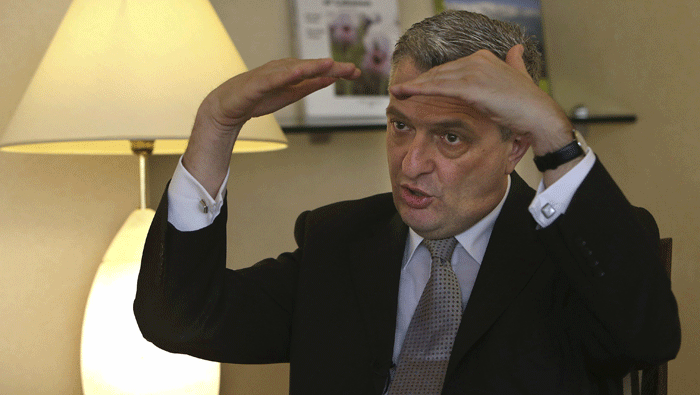
Cities could play a formal part in the global response to rising migration, top officials have suggested ahead of next year's negotiations on two international pacts to tackle the issue.
At a Global Mayors Summit on the sidelines of the United Nations General Assembly last month, the U.N. refugee chief offered robust support for cities to be given a bigger role in deciding and implementing measures to deal with migration around the world.
Filippo Grandi, head of the U.N. refugee agency (UNHCR), said his organisation is "very interested in talking to cities” and may even establish an executive committee of cities hosting refugees to advise it on how to approach the challenge.
Jürg Lauber, a Swiss diplomat who will oversee part of the global migration negotiations in 2018, likewise extended an invitation to mayors at the summit and beyond.
"It’s absolutely important that cities participate in these talks and in these exchanges,” he said, urging governments to include mayors and other city representatives in their negotiating teams.
Experts say such comments could signal a sea change in how the international community views the role of cities and local authorities in dealing with migration. "This was, in no uncertain terms, a breakthrough,” said Colleen Thouez, a senior adviser with the United Nations Institute for Training and Research (UNITAR), who moderated the discussion in New York.
"The new international actor is the city, and that starts with making sure cities are at the table,” she added.
Next year’s negotiations, the first of their kind, are aimed at tackling the chaos that has gripped governments as migration - largely driven by conflict and poverty - continues to hit new highs.
UNHCR’s annual Global Trends study found that an unprecedented 65.6 million people were forcibly displaced worldwide by war, violence and persecution at the end of 2016.
By around this time next year, the international talks aim to finalise two "Global Compacts” on migration and refugees. Yet even as preparations have got underway, the role cities will play - and how the accords could help them respond to both the negative impacts of migration and the opportunities it can offer - remain unclear.
The ambiguity has persisted despite growing acknowledgement that modern migration movements, both inside and between countries, have become overwhelmingly urban.
Today some 60 per cent of refugees and 80 per cent of those uprooted inside their own countries live in cities, according to UNHCR. Such trends constitute a significant turnaround from the traditional camp-based response to displacement adopted by the United Nations a half-century ago, and one the international community is struggling to adapt to.
The shift has placed far more emphasis on local authorities. Mayors say city services are increasingly called upon to function as first responders and are also required to take long-term responsibility for migrants’ integration and well-being.
Faced with a massive housing shortfall at the peak of the migration crisis in the summer of 2015, for instance, Athens created its first "accommodation centre” capable of holding 2,400 people, as well as a programme to match migrants with unused apartments in the Greek capital, according to a 2017 report from the 100 Resilient Cities network. A large influx of migrants can strain less obvious systems, too.
As Syrian refugees have fled to Jordan, waste production in Amman has risen by 25 per cent, the report said, suddenly making the sector a priority for international development agencies.
Get your essential daily briefing delivered direct to your email inbox with our e-newsletter
But so far cities have not been given a significant role in setting policy to deal with migration - nor the funds they need to do it, according to a mayoral declaration in June. Many are now looking to the new global agreements to change that.
"An acknowledgement of the role of local governments would in fact be a fundamental paradigm shift,” said Lamine Abbad, who works with the United Cities and Local Governments network.
UNITAR’s Thouez said the move to leverage the potential of cities more systematically is likely to make migration the second pressing international issue in which cities play a major formal role, after climate change.
Local authorities have come to be seen as central actors in curbing global warming and dealing with its impacts, following the surprise mayoral mobilization at the Paris climate talks in 2015. "There is no turning back from this,” said Thouez.
Local authorities are seeking to consolidate their stance ahead of the 2018 migration negotiations by mid-November, when they will gather in Belgium.
A major global "stocktaking” meeting will take place the following month in Mexico. Before that, a more concerted effort is needed to understand mayors’ common vision on the issues thrown up by migrants flocking to urban areas, Thouez said. "Cities need to firmly articulate their own bottom line,” she said. "This could include, for instance, ensuring education access to all child migrants regardless of status.” - Thomson Reuters Foundation